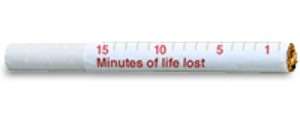Prof Hoek said among other changes, not all smokers relate to health warning on packs and new messages are needed that targeted young people. Credit: Stefan Zabunov
Just when it seemed cigarette packs couldn't be more revolting, expert health marketers are finding new ways to turn people off smokes, like creating a cigarette which looks like it is covered in slime.
The plain packs sporting gruesome pictures are a starting point, according to New Zealand researcher Professor Janet Hoek who was speaking at the Oceania Tobacco Conference 2015 in Perth last week.
Her research investigates how to better use cigarette's own packaging against smokers and changing the appearance of the 'stick' has some dramatic results in testing.
Test participants are less likely to choose a cigarette when it looks like slime or is illustrated with a timeline of minutes of life lost through smoking, compared to the standard cigarette, Prof Hoek said.
"We did some early qualitative work and we looked at reaction that some of these more dissuasive sticks elicited," she said.
"And if you are in business of de-marketing something, I can tell you it doesn't get any better than getting reactions like slime, scum, vomit and poo.
"The reason of course we got these reactions because we are directly linking these unpleasant connotations, feeling of dirt and filth, to this very act of consumption so we completely reduce the distance smokers are trying to create.
Based on the research they concluded that the product is even more important than the packaging.
"Changing stick appearance sharply decreases the appeal of smoking and undermines efforts to sanitise smoking that smokers are engaging in increasingly—it's another important opportunity to extend plain packaging," she said.
Test participants were less likely to choose a cigarette when it looks like slime or is illustrated with a timeline of minutes of life lost through smoking, compared to the standard cigarette. Credit: Janet Hoek
Among other changes, not all smokers relate to health warning on packs and new messages are needed that targeted young people, Prof Hoek said.
In addition, she said authorities need to ban the controversial descriptors like 'optimum crush sky' which replaced images on the pack when plain packaging became mandatory.
Australia has been fighting international legal challenges by tobacco companies since it introduced plain packaging in 2012, a move which made it a world leader in the war against tobacco.
The tobacco industry is as determined and as ruthless as ever to increase smoking worldwide and delay, prevent and oppose anything that might work against it, according to Public Health Advocacy Institute director and Curtin University Professor Mike Daube.
"The industry is still flourishing—the world's leading tobacco companies remain strong and powerful and well regarded as investments," he said.
Australia and its partners must be constantly alert to new approaches, Prof Daub said.
Provided by Science Network WA
This article first appeared on ScienceNetwork Western Australia a science news website based at Scitech.





















